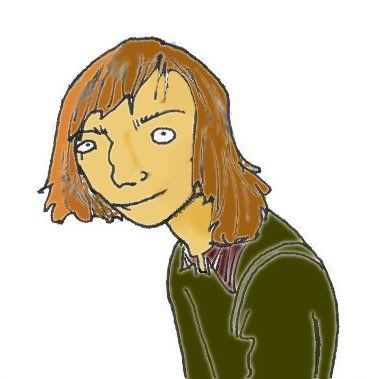So let's find out what was the best.
Note: by '2007', I mean anything put on general release in the UK this year, and by 'best', I mean favourite. Also, I haven't yet seen The Lives of Others.
In reverse order:
Michael Clayton - In which George Clooney once again proves that he's the best thing to happen to Hollywood since The Monkees. Writer-director Tony Gilroy takes a scenario that might come from one of the Bourne films (which he wrote), and places it in a much more familiar universe, populated by characters suffocating under a deadening corporate presence. The cast are excellent - Tom Wilkinson desperate and haywire, Tilda Swinton almost unwillingly ruthless - and the minimalist score by James Newton Howard doesn't let you forget that even people talking can be thrilling. Throughout the film, Clooney's Clayton is worn down more and more by all kinds of guilt, physically sagging and not once cracking a smile until the hackneyed, uncomfortably snug ending. Surprisingly watchable stuff.
The Science of Sleep – Following up his massively accomplished Eternal Sunshine of the Spotless Mind, Michel Gondry delivered this surreal autobiographical tale of unrequited love. Initially, I was distracted by how the film suffers in comparison to Eternal Sunshine without Charlie Kaufman’s exquisite writing. Indeed, the writing isn’t as well characterised as Kaufman’s, but this lends the film a sense of liberation rarely seen in the mainstream. Gondry mixes his trademark lo-fi manipulation of the mise-en-scène with the freewheeling, character driven traditions of new wave cinema. It’s chaotic, absurdly tragic, desperately serious and over-crammed with ideas. As such, it captures reality more accurately than 95% of films.
The Bourne Ultimatum - Spider-man, Pirates, Rush Hour, Ocean's - too many trilogies lost their way this year. Paul Greengrass apparently saw this coming when he watched The Bourne Identity. He saw a lot of potential, and so gave us a taster in The Bourne Supremacy. We were excited. Then, he unleashed all of that potential by taking exactly what made the other films so good, and making it bigger, faster and more punchy. Starting with a probably-legendary chase in Waterloo Station, the film briskly whips all around the globe, to an enthralling, unforgettable action scene in Tangiers. This is proper action, without gimmicks or fighter jets, that moves so fast, you should really wear a helmet.Bridge to Terabithia – There were so many reasons this film shouldn’t have worked. It’s a Disney film, but Pixar aren’t involved. The protagonists are kids, but they’re not saying anything rude or ironic. Robert Patrick is in it, but he’s not kicking any ass. Worst of all, it was marketed as The Chronicles of Narnia: Even more lame this time. Luckily, director and Rugrats co-creator Gapor Csupo handles it with remarkable sensitivity and vitality. Like with Rugrats, Csupo displays a remarkable ability to reflect the worldview of children, and explores the subject matter with a surprisingly hefty emotional punch. The most grown-up kids’ film of the year.
The Assassination of Jesse James by the Coward Robert Ford – Two successful westerns were released this year, which got some people hopeful for a genre revival. The first, 3:10 to Yuma, was a rollicking, guns-n-horses tale of fatherly love and redemption. The second, Jesse James, is almost the polar opposite – a grim, weighty and subtly tense tragedy. Brad Pitt gives the best performance of his life as James, who he portrays as a paranoid psychopath who is struggling to live with his own myth. The scenes between him and Casey Affleck as Ford are alive with nervous energy, the ominous and inevitable threat always present. Everything is shot through glass; truths are distorted, features are exaggerated to the point of burden and America is a melancholy wasteland healing from a terrible war. Yuma was received more readily, with some critics complaining that Jesse James is ‘just too long and too slow’. Stupid, stupid, stupid critics.Atonement – This blew apart all of my prejudices against English period dramas. Passionate as a romance, devastating as a war film, enthralling as a thriller and authentic as a period piece. Not a frame is wasted; every part of the film feels entirely complete, and utterly polished. Director Joe Wright perfectly paces the shifting, deceptive tone of the plot, and brings to life the vital issues within it, Seamus McGarvey provides some of the best cinematography of the best ten years, and James McAvoy reminds us why Shameless isn’t very good anymore – because he’s not in it. Made with intrigue, beauty and a fierce passion, this is everything I thought this kind of film wasn’t.
This is England - I wasn't alive in the early 80s. I've never hung out on a council estate in Nottingham. My only interaction with skinhead culture is avoiding eye contact. But even with all that I just know that This is England captured all of those things very authentically. Shane Meadow's knowledge and love for his subject is felt in every shot, from the detail of the ska-punk culture as embraced by the characters to the actors' hugely naturalistic banter. The first act of the film is the most joyfully satisfying of the year, meaning that of course the final act is the most tragic and miserable. 11-year-old Thomas Turgoose gained much of the critics' attention, but the rest of the cast are just as impressive. Stephen Graham, he of Snatch fame, portrays the scary thug Combo with a raw sensitivity, a living embodiment of all the contradictions of skinhead culture.








